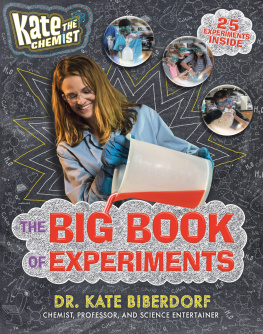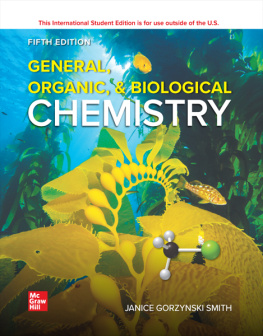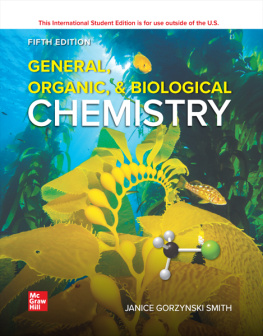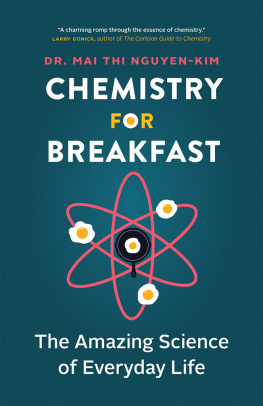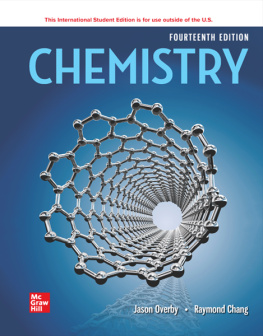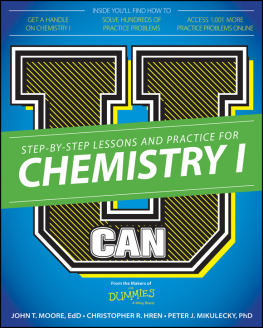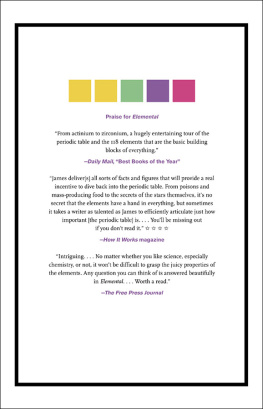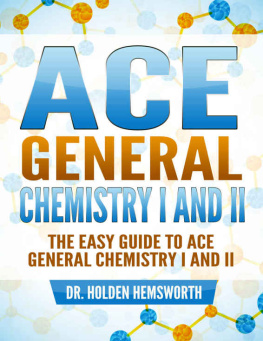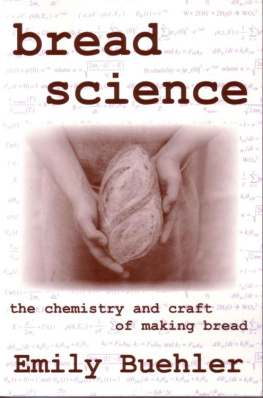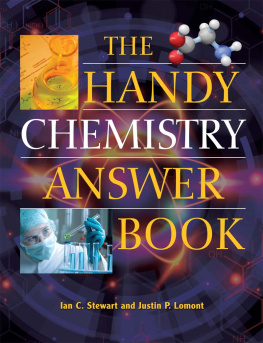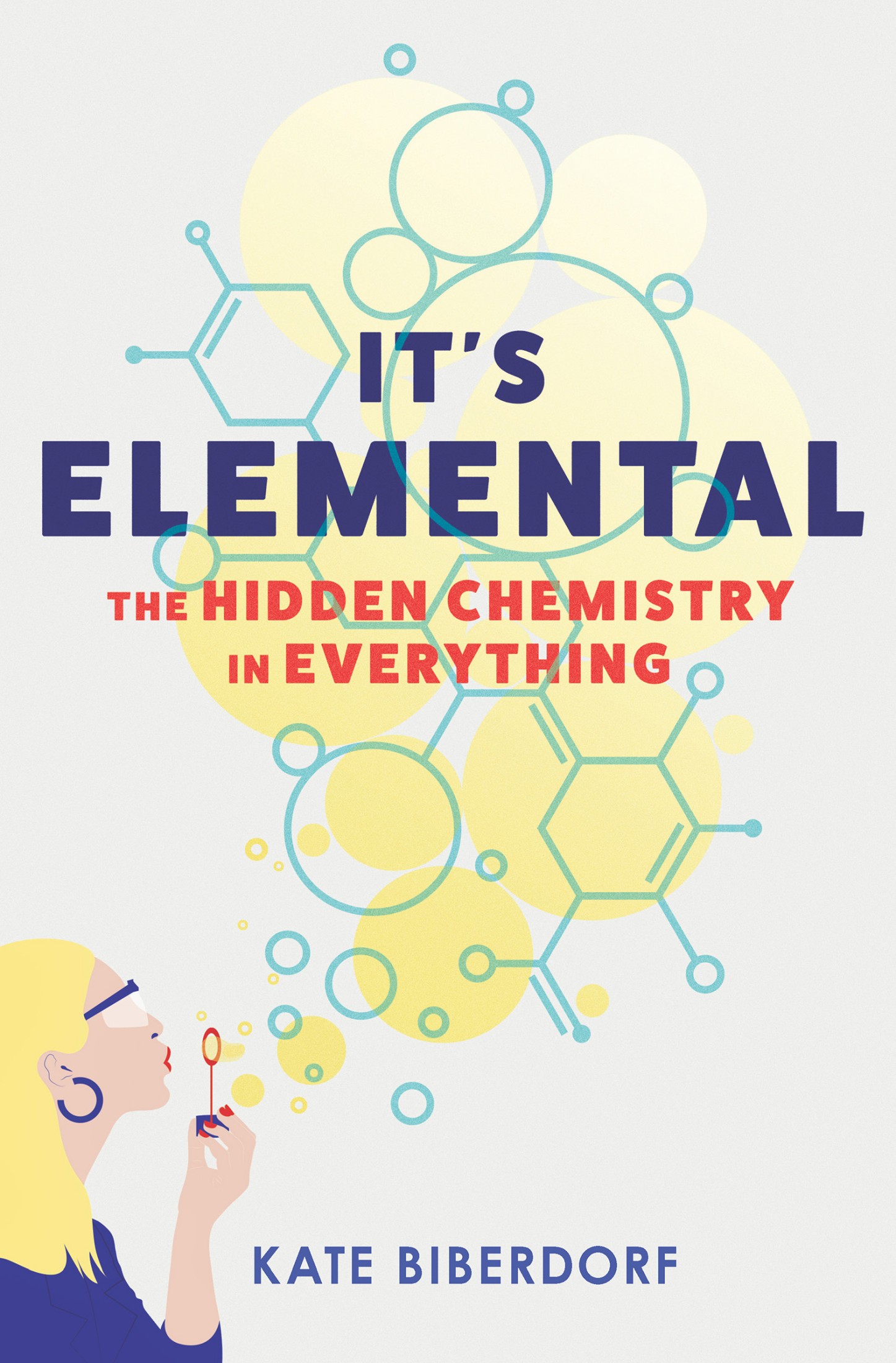
Praise for Its Elemental
Whether youre baking a pie, washing your hands, or watching a sunset, Dr. Biberdorf shows that science is everywhere and its fun! Shes a proud nerd, and in the pages of this essential book youll discover the great wonder of chemistry... After all, its elemental.
Bill Nye
Kudos to Kate Biberdorf for reminding us how fun it is to explore lifes mysteries, even here on planet earth.
Peggy A. Whitson, PhD, astronaut, former commander of the International Space Station and chief of NASAs Astronaut Office
I wrote this book with the hope that youll not only get chemistry but feel excited about it. I hope youll discover something new and unexpected about the world around youand that youll want to share what you learn with your partner, your children, your friends, your colleagues at work...even strangers at happy hour. Because I strongly believe that we can make the world a better place with a love of science.
Kate Biberdorf
ITS ELEMENTAL
THE HIDDEN CHEMISTRY IN EVERYTHING
KATE BIBERDORF

Dr. Kate Biberdorf is a scientist, a science entertainer and a chemistry professor at the University of Texas. She has a PhD in inorganic chemistry from the University of Texas and has published her work in Catalysis, Science and Technology. Kate is the author of the bestselling kids book The Big Book of Experiments and has appeared on the Today show, The Kelly Clarkson Show, The Wendy Williams Show and The Late Show with Stephen Colbert. She lives in Austin, Texas, with her husband and two dogs (and one very grumpy cat).
KateTheChemist.com
For my chemistry teacher,
Mrs. Kelli Palsrok
Contents
INTRODUCTION
Nerds like us are allowed to be unironically enthusiastic about stuff.
Nerds are allowed to love stuff,
like jump-up-and-down-in-the-chair-cant-control-yourself love it.
...When people call people nerds, mostly what theyre saying is you like stuff.
JOHN GREEN
I want to start this book by admitting something.
I am a nerd about chemistry.
Im a chemist, my husband, Josh, is a chemist, and most of our friends are scientists too. (Not all, but nobodys perfect.) Ive been known to hold casual conversations about quarks. Josh and I have discussed the parameters of a Nobel Prizewinning experiment on date night and had an intense argument about which element on the periodic table is the bestits palladium, obviously.
But I know not everybody is like that.
In fact, most people arent.
Chemistry can be hard to understand. Heck, science in general can be difficult to comprehend. There are so many terms and rules, and everything can seem so incredibly complex. Thats especially true with chemistry because we cant see any of it.
In biology, you can dissect a frog.
A teacher can show you the properties of physics, like acceleration, in real life.
But I cant just hand you an atom.
Even my friends and family dont get what I do sometimes. My BFF, Chelsea, is the perfect example. Shes super smart, understands science in general and even has a job thats related to chemistry as a jeweler. But Chelsea never got what was going on in our high school chemistry classes. While I was enthralled, Chelsea felt simultaneously bored and lost. And when we were sophomores in high school, I simply didnt understand how she felt.
But today, I totally get it. I see students like Chelsea nearly every day.
As a professor at the University of Texas at Austin, I teach a class called Chemistry in Context. Its an introductory course intended for students who will probably never take another science class ever again. Imagine an English major trying to take the easiest science course she can get a C in, and youll have it.
One year, on the very first day of class, a student asked me a question about quarks, and I ended up in a long tangent about subatomic particles in front of five hundred brand-new freshmen. Some students were trying to frantically take notes while a bunch were just staring at me in various states of shock and fear. Others had resorted to filming me on their phones. Two girls were literally clutching each other.
The whole incident would have been funny if I hadnt freaked out hundreds of students who had decided to give chemistry (and me) a chance. Most of the students had no idea what I was talking about. I might as well have been speaking Klingon. Im sure this situation only reinforced the myth that science is boring and impossible to understand.
Thats because words matterespecially when we talk about science.
When I first got my PhD, I emailed my mom a copy of my dissertation. Minutes later, she called me. Before I could even say hello, I heard her laughing and didnt understand why. Did I send the wrong attachment? Had she just watched a silly cat video? Did she butt-dial me?
Finally she sputtered, Katie, I dont know what any of these words mean! Whats an ass...napthyl? My mom was laughing so hard that she couldnt say anything else. I was so confused. I had told her what my research was about. Why wasnt she getting it?
Then I opened the document and read the first line:
The syntheses and catalytic properties of six new 1,2-acenaphthenyl
N-heterocyclic carbene-supported palladium(II) catalysts are presented.
The acenaphthenyl carbene can be prepared using either mesityl or
1,2-diisopropyl N-aryl substituents.
In that moment, I understoodwhat my mom read, what my students heard, and what Chelsea had felt. My mom had no idea what I meant by 1,2-acenaphthenyl N-heterocyclic carbene-supported palladium(II) catalysts .
And frankly, she didnt need to. (In case youre wondering, its a type of catalyst used in reactions needed to make pharmaceutical drugs.)
Chemistry is so cool, so freaking awesome, but often chemists (including me) talk about the science in a way that loses everybody without a PhD. In this book, Im going to do the opposite. My mission is to show my momand all of you why I am passionate about chemistry. Why its amazing, why its super exciting, and why you should love it too.
I promise there will be no discussion of quarks or even a description of the scientific method. But by the time you finish reading, youll have an understanding of basic chemistry, and youll see that chemistry is hidden in everything, from the shampoo you use on your hair in the morning to that beautiful sunset at night. Its in the air you breathe, which is something that you literally cannot live without. Its in everything you touch and encounter every single day. And the more you know about it, the more you can appreciate the world we live in.
Just look around yourself right now. Everything you see is matter. All matter is comprised of molecules, and molecules are made of atoms.
The ink on this page is a molecule that has been absorbed into the fibers of the paper, and the glue in the binding is just a fancy molecule that binds to both the paper and the cover. Chemistry is every where and in every thing .
In the first four chapters, Ill explain what you need to know in order to understand the basics of atoms, molecules, and chemical reactions. You can think of this as Chemistry 101, or a recap of what your teacher was talking about while you were writing notes to your bestie in tenth grade. (BTW, I promise that by the end of this section, youll finally get atoms.)
The second part of the book is about chemistry in everyday life, from the coffee you make in the morning to the wine you drink at night. In between, well do all sorts of fun things: bake, clean, cook, work out, even go to the beach. Along the way youll learn about the chemistry at work in your cell phones, sunscreen, and in fabrics, among other stuff you use every day.
Next page

